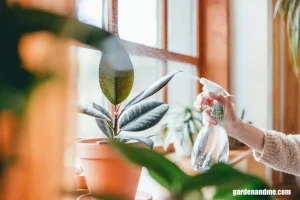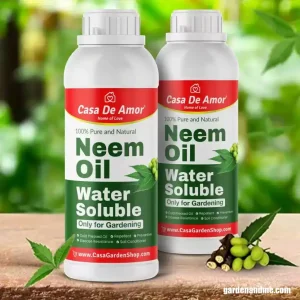Neem oil is a powerful garden weapon that can be used on many plants to control pests and diseases. Its broad-spectrum properties make it effective against various insects and fungal infections. However, there are some plants that you should avoid using neem oil on. Hence, in this article, we will explore what neem oil is and how plants are treated with neem oil to make our garden plants operate effectively.

What is neem oil?
Neem oil is a natural plant-based oil derived from the seeds of the neem tree (Azadirachta indica). It has been used for centuries in traditional medicine, agriculture and has various applications. Neem oil can be used for multiple biologically active compounds with insecticidal, antifungal, and antimicrobial properties.
Neem oil is safe when used as directed. However, it is essential to use it with caution and follow the instructions provided by the manufacturer. Some people may be sensitive to neem oil, and it can cause skin irritation or allergic reactions in some individuals. It is recommended to perform a patch test before applying it on a larger skin area. Additionally, it is advisable to avoid consuming neem oil, which may be toxic if ingested in large amounts.
Is neem oil burn plants? Adv and disadv of neem oil to plants
Advantages
Yes, several plants can still benefit from neem oil application.Neem oil is known for repelling or controlling common garden pests, such as aphids, whiteflies, and spider mites. Using neem oil on these garden plants can help protect them from damage and promote overall plant health.
Disadvantages
While neem oil is generally safe and beneficial for plants, improper use or excessive application of neem oil can cause problems.
Neem oil can burn plants if not diluted or used according to the instructions. It is recommended to always dilute neem oil concentrate before applying it to plants. Mix the oil with water or a carrier oil at the recommended ratio to prevent any potential of burnt or damaged plants with neem.
When used correctly, neem oil should not kill plants. However, excessive or improper application can negatively affect plant health. Use neem oil sparingly and avoid over-application to prevent any potential harm to the plant.

Which kinds of plants use and do not use neem oil?
While neem oil is generally safe for most garden plants, there are a few exceptions to remember. It is always a good idea to check the label or consult a gardening professional to confirm its suitability for specific plants. Additionally, avoid using neem oil on young or newly transplanted plants, as they may be more sensitive to the oil.
Typical plants
Plants with delicate foliage, such as ferns and some flowering plants, also can be sensitive to neem oil. It is best to test a small area of the plant before applying neem oil to the entire plant. If there is any sign of damage or discoloration, do not use it on plants.
Neem oil can be applied to indoor plants to control pests and diseases. Indoor plants can also benefit from neem oil’s antifungal and anti-bacterial properties. However, it is essential to apply neem oil in a well-ventilated area or near an open window to prevent a buildup of fumes.
Overall, some plants are sensitive plant compared to others. As mentioned earlier, plants with delicate foliage or those in the early stages of growth may be more susceptible to damage from neem oil. It is always best to spray your plants with neem oil in a small area before applying it to the entire plant.
Mature plants
Neem oil can also effectively control pests and diseases on various mature plants.
Fruit trees
Yes, neem oil may be sprayed on fruit trees (tomato plants, cucumber, etc) to control common pests and diseases. However, applying the neem oil in the morning, during the dormant season, is essential to minimize the potential harm to beneficial insects, such as bees.
Ornamental plants
Neem oil is safe for use on various ornamental plants, including flowers and shrubs. Its natural properties make it an effective solution for controlling pests and diseases without harming plants or the environment.
How neem oil is applied to plants?
As with any product, it is recommended to consult with a healthcare professional or an expert in the field before using neem oil, especially if you have any underlying health conditions or are pregnant or breastfeeding. Therefore using neem oil on plants, it is essential to follow the recommended guidelines to ensure its effectiveness and safe to use.
To mix neem oil for plants, dilute pure neem oil with water or carrier oil according to the instructions on the product label. The recommended ratio may vary depending on the brand and concentration of the neem oil. Always read and follow the manufacturer’s instructions for best results.
You can make a neem oil spray to your plants. Mix the diluted neem oil with water in a spray bottle and shake well to ensure proper mixing. Spray neem oil solution onto the plants’ leaves, stems, and affected areas. Be sure to cover the leaves’ upper and undersides for maximum effectiveness.
The frequency of neem oil application may vary depending on the specific plant and pest/disease issue. As a general guideline, it is recommended to apply neem oil every 7 to 14 days for preventive purposes. However, for severe pest or disease infestations, you may need to increase the frequency of application to every 4 to 7 days.
